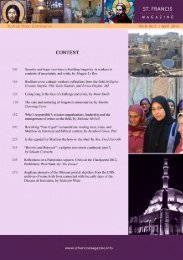download the pdf - St.Francis Magazine
download the pdf - St.Francis Magazine
download the pdf - St.Francis Magazine
You also want an ePaper? Increase the reach of your titles
YUMPU automatically turns print PDFs into web optimized ePapers that Google loves.
<strong>St</strong> <strong>Francis</strong> <strong>Magazine</strong> Vol 8, No 4 | August 2012<br />
bius of Caesarea to his church <strong>the</strong>re. (It was kept in <strong>the</strong> Ecclesiastical<br />
History of Socrates, and in Athanasius’ Apology of Nicaea.) The description<br />
of <strong>the</strong> council sessions is kept in Eusebius’ book Life of<br />
Constantine, and letters from Constantine and letters from <strong>the</strong> council<br />
to <strong>the</strong> churches are also present <strong>the</strong>re. Also, we still have <strong>the</strong><br />
twenty canons issued by <strong>the</strong> council. Also, <strong>the</strong> historical writings of<br />
Socrates, Sozomen, Rufinus and Eusebius of Caesarea contain many<br />
details about <strong>the</strong> council.<br />
In fact, <strong>the</strong>re is no reference to <strong>the</strong> subject of fixing <strong>the</strong> number<br />
and identity of <strong>the</strong> books of <strong>the</strong> New Testament or <strong>the</strong> deification of<br />
Christ in ei<strong>the</strong>r of <strong>the</strong>se ancient primary sources (like Socrates, chapter<br />
8, Sozomen, chapters 17 to 21, and Eusebius).<br />
The Available historical sources on <strong>the</strong> council of Nicaea:<br />
Theodoret, Historia Ecclesia, Book I, ch. 6 .13<br />
Socrates, Historia Ecclesia, Book I, ch. 8 ch 21<br />
Esuebius,Vita Constantini, Book III, ch 6 ff<br />
Eusebius, On <strong>the</strong> Feast of Easter / De solemnitate paschalis.<br />
Athanasius, Ep. Ad episcoposAfricae, 5.ff<br />
Athanasius, de decretis synodis.<br />
Epinphanius, Haereses or Panarion, 69<br />
Philostorgius, HE I, 7, 7a<br />
Rufinus ,Historia Ecclesiastica 10.1-6<br />
Geasius of Cyzicus, Historia Concilii Nicaeni<br />
Jerome, Prologue to Judith<br />
When <strong>the</strong> Council Fa<strong>the</strong>rs endorsed <strong>the</strong> ante-Nicene hermeneutical<br />
tradition regarding <strong>the</strong> correct, Orthodox interpretation of Holy<br />
Scripture, <strong>the</strong>y denounced Arius’ contention that <strong>the</strong> Logos had<br />
been at some point in time created, and that his essence was not <strong>the</strong><br />
same as <strong>the</strong> divine essence. This <strong>the</strong>y did with <strong>the</strong> memorable<br />
words: “We believe […] in one Lord Jesus Christ, <strong>the</strong> Son of God,<br />
begotten of <strong>the</strong> Fa<strong>the</strong>r, Light of Light, very God of very God, begotten,<br />
not made, being of one substance with <strong>the</strong> Fa<strong>the</strong>r…”<br />
It’s clear now that <strong>the</strong> Christology of Nicaea was <strong>the</strong> same faith<br />
of <strong>the</strong> New Testament and <strong>the</strong> early centuries before Nicaea; it’s<br />
“<strong>the</strong> faith which was once delivered unto <strong>the</strong> saints” (Jude 1:3).<br />
Claims by authors like Pagels that Nicaea somehow produced <strong>the</strong><br />
<strong>St</strong> <strong>Francis</strong> <strong>Magazine</strong> is a publication of Interserve and Arab Vision 449







![Reflections on Surah Fatiha and the Lord's Prayer[1] - St.Francis ...](https://img.yumpu.com/49377951/1/184x260/reflections-on-surah-fatiha-and-the-lords-prayer1-stfrancis-.jpg?quality=85)









